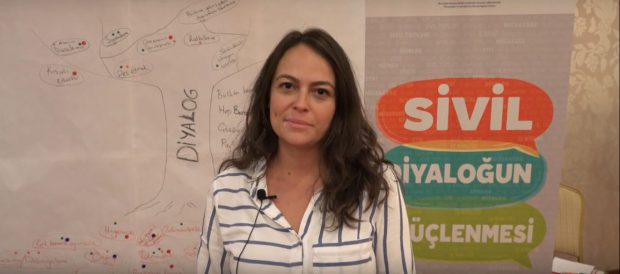YADA Foundation Keeps On Working on Strengthening Civil Dialogue

Civil Dialogue Workshop activity series within the scope of the Strengthening Civil Dialogue Project carried out by YADA Foundation with the support of the European Union has been finalized. We talked with Ceylan Özünel from YADA Foundation about the works that have been planned and intended to be carried out within the project.
What is the Strengthening Civil Dialogue Project? Can you tell us about it?
As YADA, we carry out a lot of research and studies to increase the impact capacity of civil society. In line with the findings of our research, we have found that one of the most important factors of the ineffectiveness of civil society on both decision-makers and citizens is the weakness of dialogue both within the society and the partners. Accordingly, we design a series of studies and researches on strengthening the dialogue between partners. The main objective of Strengthening Civil Dialogue project is to contribute to the strengthening of the dialogue and relationship between civil society and public and private sectors, thereby increasing the impact of civil society.
What kind of activities do you carry out within the project?
We plan to conduct various researches and activities within the project. We’ve started our first research study. In this research study, which we call Dialogue Mapping, we analyze the dialogue and relationship forms established by NGOs both within themselves and with public and private sectors, and analyze the areas and reasons why a dialogue has not been established. In this direction, we have grouped NGOs according to their working areas and backgrounds. We have made in-depth interviews with more than 100 NGOs from various cities of Turkey. As part of the research, we have organized Civil Dialogue Workshop activities four times in various cities so far and met with different partners. We’ve conducted discussions on dialogue in our workshops held twice in Istanbul as well as Ankara and Diyarbakır. The outputs of the workshop will be included in the report of our Dialogue Mapping research and we will try to popularize this report as much as possible.
Could you tell us more about these activities? What methods do you use?
In our events, we arrange the seats in a circle, so that we try to create an environment in which everyone sees and listens to each other as well as participate actively in discussions. In the activities of the Civil Dialogue Workshop, we conduct a joint discussion on all the activities of civil society and their impact. In the workshop, we have a problem tree study which is discussed altogether. Here too, we focus on the root causes of the failure to establish dialogue between partners.
“We discuss the implications of the failure of establishing dialogue, and we do group work on the problem areas that are prioritized by the participants and discuss solutions for these problems. We constantly strive to improve the methods we use in our workshops.”
Hence, we may use different methods in every workshop. For example, in the last two workshops, we discussed the causes and consequences of lack of communication and lack of dialogue between partners with drama techniques and dramatization methods. The topic of the last workshop was civil society and private sector dialogue and relationship styles. It was our first workshop in which we included the private sector in addition to civil society as well as the public. In the afternoon session of the workshop, we gave some of the disputes between NGOs and private sector to the participants as cases. The participants were divided into groups and tried to solve these cases through dialogue and communication. As I said, we use this kind of different discussion methods that we constantly improve and develop according to the subject and the participants.
What else will you do under the project?
Within the scope of the project, we organize Social Impact Oriented Communication and Design workshops for NGOs. We did the first two in Istanbul and Izmir. Next year we will have three more workshops in Samsun, Ankara and Diyarbakır. In these workshops, we discuss the concept of social impact and discuss what social impact-oriented communication and design is, why it is important and in what kind of system and model it should be. In addition, we have a social impact consultancy work with several institutions consisting of workshop participants. Within this consultancy, we establish an impact monitoring system by addressing the project of the NGO or the institution in general.
Apart from these, we will continue our Arena meetings that we had started last year. Again, we will bring NGOs, public institutions and the private sector together on different themes and backgrounds, and will conduct discussions under a specific issue and topic. We will have a media monitoring research project within the project next year. There, we will also analyze the visibility of civil society among the media and publish a report.

Bizi Takip Edin